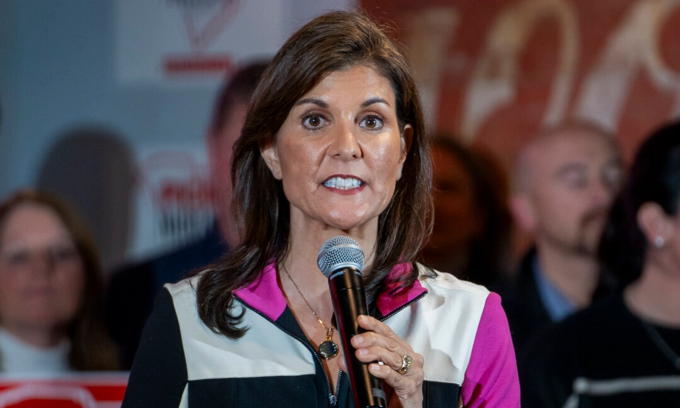While GOP candidate Nikki Haley was campaigning against former President Donald Trump, she declared: “Chaos follows him.” But now, in an ironic twist, fallout from Ms. Haley’s campaign threatens to cause chaos for other Republicans’ campaigns for years to come.
The problem is that organizations that supported Ms. Haley recruited non-Republicans to change their voter registrations to the GOP, then encouraged them to vote for her in states that permit “crossover” voting in primaries or caucuses. Thus, in those states, many left-leaning voters now are masquerading as Republicans in voter data files—information that campaigners and pollsters mine to do their work.
This crossover-voting tactic is similar to the “Operation Chaos” initiative that conservative talk radio host Rush Limbaugh had advocated in years past.
He urged Republican voters to vote Democrat and “keep the primaries going” in 2008, after then-Sen. John McCain (R-Ariz.) had locked up the Republican nomination for president. McCain subsequently lost the presidential election to Democrat Barack Obama.
Now, Republicans are seeing the tables turned, with costly consequences.
In separate interviews with The Epoch Times, pollsters Rich Baris and Tyler Bowyer, who work with the conservative Turning Point Action political organization, concurred that ripple effects from the Democrat-switching voters could cost Republican candidates tens of millions of dollars.
That financial toll will come from futile marketing efforts and data-cleanup operations; the tainted data could also cause losses in races that Republicans otherwise were positioned to win.
Enhanced Use of Old Tactic
“It’s really been happening for years,” Mr. Bowyer said. “But [what] we’ve realized, over time, is that it’s so detrimental to the Republican Party.”
Even so, this year’s election cycle featured the best-funded, most organized crossover-voting effort either of the interviewees had ever seen.
At election polls in various states, firsthand witnesses for Turning Point Action saw that these voters “were organized; they were told to show up,” according to Mr. Bowyer.
In several states that held presidential preference contests before Ms. Haley exited the race on March 6, at least 5 percent of the Republican-designated primary voters “are now really Democrats,” he said.
“You have to basically go back and re-identify who these people are, and there’s really not a great way to do that,” Mr. Bowyer said.
His biggest concern: The data problems will make it harder for Republicans to win in November, he said.
“It’s going to impact not only the presidential race but everything all the way down the ballot,” Mr. Bowyer said, even races for seats on local school boards and city councils.
Because of the now-misleading voter registration designations in the voter rolls, Republicans “will actually go knock on the doors of Democrats who have no interest in voting for any type of Republicans in November,” he said.
“And now they’re going to effectively waste their time and energy reaching out to those voters,” Mr. Bowyer said.
Long-Lasting Impact
In many local contests, only a few dozen votes could make the difference between victory and defeat.
“Having all these Nikki Haley Democrat voters that now are seemingly Republican” can cause candidates to lose those races, according to Mr. Bowyer.
Mr. Baris estimated that it would take two to four election cycles to identify and purge anti-Republicans from the data.
“We need at least two cycles before we can be comfortable that we can weed somebody out,” he said. “Otherwise, we are risking weeding out a new Republican voter who was a Democrat … and we risk ignoring them, not engaging them.”
However, others discount the detrimental effects of the crossover votes.
Longtime Democrat strategist David Carlucci said he considers the open-primary system “a healthy thing for democracy.”
“It makes the campaign’s job harder,” he told The Epoch Times. “But I think it gives more options to the voter, which should be the case.”
Ms. Haley previously told The Epoch Times that she believes that her candidacy benefited the GOP by welcoming people who previously felt excluded from the Republican Party.
But insiders such as Mr. Baris and Mr. Bowyer have said they believe that the distorted data will cause problems that far outweigh the impact of any genuine converts to the Republican ledgers.
Love Versus Hate?
Both men point to exit polls and news media interviews with voters who admitted they were casting ballots for Ms. Haley mostly to offset votes for President Trump.
The former president repeatedly said large vote totals would reflect the strength of his candidacy, sending a loud message to his presumed Democrat opponent for the Nov. 5 general election, President Joe Biden.
In retaliation, a segment of President Biden’s supporters decided to vote for Ms. Haley. They apparently decided that racking up her vote totals and detracting from President Trump’s margin of victory was more important than casting a vote of confidence for President Biden, who faced no major threat from Democrat contenders.
“There are Democratic voters who hate Trump more than they love Joe Biden,” Mr. Baris said, explaining the phenomenon.
Still, he said, the crossover voters most likely were repeatedly goaded into taking that step. It typically requires six or seven “points of contact” to persuade people to take action.
“That’s the industry standard … you can’t just send a mailer to a voter and get them to crossover,” Mr. Baris said.
Following the Money
Making all of those contacts costs money and requires organization.
In an unusual move, Democrats heavily funded Ms. Haley’s campaign—something Mr. Baris said he cannot envision Republican donors doing for a Democrat candidate.
Likewise, he said he doubts that Democrat-leaning groups would lead organized efforts to persuade Democrats to vote for a Republican, as they did for Ms. Haley. He obtained flyers that were targeted to Democrats, urging them to vote in Republican contests in several states.
Mr. Carlucci suggested that political consultants should be able to overcome data issues that the Haley crossovers caused; that’s their job, he said.
But Mr. Baris said excising the disingenuous flip-flopping voters is an arduous, costly task—one that Republicans have trouble getting donors to support.
Democrat donors seem willing to fork over cash to pay for behind-the-scenes grunt work, he said.
But Republicans “cut checks for dumb things like, ‘Oh, I want to have a say in the ad you’re gonna run,’ or ‘I want to be able to pick up the phone and call the candidate whenever I want,’” according to Mr. Baris.
That’s how Republican donors have been conditioned to think over the years, he said; Democrat donors were programmed differently.
“They understand what really wins elections; you can get a Democrat millionaire or billionaire on the phone, and they’ll pop their checkbook out automatically,” Mr. Baris said. “That is not the case with Republicans.”
Remedial Action Needed
“We don’t have a well-oiled machine that’s preventing people from messing around with our data,” Mr. Bowyer said of Republicans.
Democrats have responded more decisively against Democrat-labeled candidates whose activities might undermine the party as a whole, he said.
“They‘ll kick you out; they’ll say, ‘You’re no longer welcome,’” Mr. Bowyer said.
He said he thinks that’s partly why presidential candidate Robert F. Kennedy Jr. (RFK) disconnected from the Democratic Party to run as an independent.
“RFK was forced to represent independents because the Democrats cut him off,” Mr. Bowyer said.
Indeed, Mr. Kennedy told a South Carolina audience in October 2023: “They’re trying to make sure that I can’t participate at all in the political process.”
Mr. Bowyer, in an interview before new leaders were installed at the Republican National Committee (RNC), said he hopes the RNC will act differently in the future.
He said he thinks stronger measures are needed to rein in candidates such as Ms. Haley, who lack a viable path to victory and are courting voters from the other party. Failure to clamp down on such candidates is “like knifing your own self in the back,” he said.
He conceded that competitors have the right to throw their hats into the ring. Yet he said those candidates should be discouraged from persisting with a doomed campaign, which will “mess up all the data that’s going to affect everyone else.”
An attitude shift is needed to get Republican leaders and donors to prioritize “the very necessary work that Republicans are very behind on right now,” including data management, according to Mr. Baris.
“That work is not sexy,“ he said. ”But it wins elections.”
Nathan Worcester contributed.



















Haley’s campaign threatens to cause chaos for other Republicans’ campaigns
Another idiot RINO willing to do anything to hurt Trump and the GOP.
Haley declares “Chaos follows him.” ,,,and totally ignores the chaos she creates with Democrat crossover voters bent on diminishing Trump personally, and the Republican campaign finances generally, who will never vote other than democrat in the general election anyway. She allows herself to be used as their pawn that is democrat designed and destined to be sacrificed on the American chessboard of final elections. Shame on her for being so beguiled and abusing which shows just how unfit she is to lead a party into battle, let alone a whole nation. Take gender, class, race or social standing out of the equation and the choice is clear, if RESULTS are the end game, not just being able to “feel” good about another social experiment that ends up blowing up in our faces.
THIS IS why for years, i’ve advocated that we do AWAY WITH “Crossover voting” for primaries, then letting those folks shift BACK TO their normal party for the general election..
BECAUSE FAR TOO OFTEN we see that tactic used BY DEMS TO STACK THE DECK against the proper conservative, so they can push the one they WANT TO DEFEAT, for the general…
“The problem is that organizations that supported Ms. Haley recruited non-Republicans to change their voter registrations to the GOP, then encouraged them to vote for her in states that permit “crossover” voting in primaries or caucuses.”
Wasn’t it Ferrarri who said “Aerodynamics are for people who cant build good engines”?
All the pre-election shenanigans remind me of that. How about good candidates? Besides Reagan and Trump what pro American choices have there been in recent memory?
And, when you DO have a clear would winner everyone else please sit down!?
(Black voters are not switching to Trump because of “Republican” policies. It’s because of TRUMP policies. He made changes and everyone gained from it, thus proving Trump good for ALL, and it did NOT take three generations to see the return on investment.)